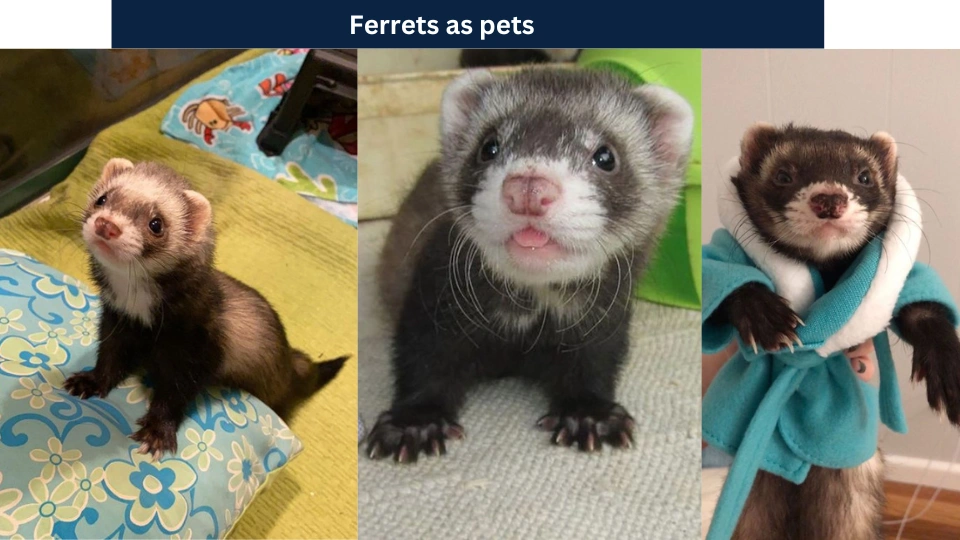Last Updated on March 13, 2024 by Aftab Tariq
Ferrets as pets are members of the weasel family, known for their intelligence, social nature, and energetic personalities, making them lively companions. Ferrets are like tiny, furry friends that have been living with humans for a long time, around 2000 years.

They belong to the weasel family. Even though they might seem small and easy to care for, they need a lot of attention, just like cats or dogs. Cute and playful ferrets resemble dogs in their friendliness and love for human company. They’re energetic, trainable to use a litter box, and enjoy snuggling, making those lively and affectionate companions. Dr. Tynes says,
“Don’t consider getting a ferret unless you’re able to provide a spacious cage, indoor play area, and dedicate ample time for observation.”
Having a ferret as pet can be a lot of fun, but it’s only for some. They’re playful, loving, and usually quiet during the day, which makes them great companions. But before deciding to bring one home, it’s essential to consider the good and not-so-good things about having Ferrets as pets. Let’s learn some important facts Ferrets as pets.
What Is Ferrets?
Ferrets are cute little animals that usually live around 5 to 7 years, but the oldest ferret ever lived to 14. They’re curious and like to explore. Ferrets are social, so it’s best to adopt them in pairs so they can keep each other company. If you have small kids at home, getting a ferret might not be a good idea because they’re delicate and can get hurt easily if not handled gently.
Like cats, ferrets love to sleep up to 20 hours a day. But when awake, they’re super active and love to play. They’ll bounce around and try to get you to play with them, too. They enjoy crawling through all sorts of things like boxes, pipes, and even your clothes. They can be rough when they play, sometimes nipping, but you can teach them not to.
Baby Ferrets
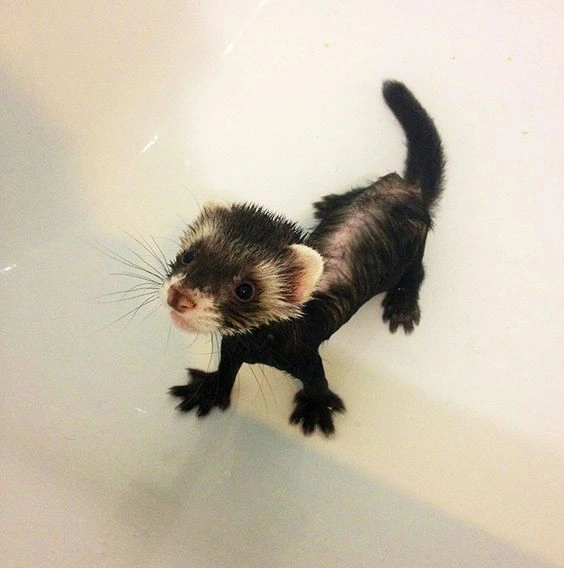
When ferrets are babies, they’re called kits. When born, kits usually weigh 6 to 14 grams and are about 2 to 2.5 inches long. That’s almost as small as an adult human’s little finger. They’re born with soft fuzz for fur, like a baby’s hair. As they grow up, their fur gets longer, and their colours become clearer. Some kits stay light in colour, like champagne, chocolate, and light roan, while others, like sables, gradually turn darker, with lighter gray hair on their heads.
Facts To Know Before Keeping Ferrets As Pets
Consider the comprehensive guide before making the decision to keep Ferrets as pets.
Grooming Of Ferrets
Ferrets are naturally clean creatures with a distinct smell that doesn’t completely disappear, even with baths. This smell is stronger in ferrets that haven’t been neutered, but most ferrets in North America are neutered when they’re very young, so it’s usually not a big issue.
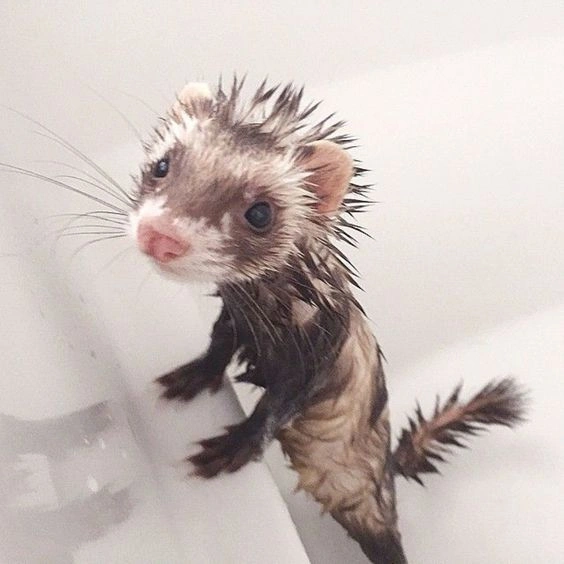
Like cats and dogs, ferrets have scent glands near their bottoms that can give off a strong smell when scared. However, most ferrets you’ll meet have had these glands removed, so the smell is pretty good. It’s best to bathe ferrets only once or twice a month at most. Bathing too often makes them smell worse because it removes their natural oils, which their bodies try to replace by producing even more oil.
Ferrets are good at grooming themselves, like cats, and they’ll often clean their faces in a bowl of water if you provide one. But if they’re itchy from fleas or dry skin, a bath with pet-friendly shampoo and warm water can help.
Diet For Ferrets
Feeding ferrets is like feeding cats they need meat to stay healthy. Their food should be high in fat and have lots of meat protein that’s easy to digest. Ferrets can’t handle plant stuff or fibre well, so avoiding foods with lots of grains or veggies is best to keep them from getting sick.
The best foods for ferrets are whole prey, like mice or rats, but if that’s not possible, special ferret or good-quality kitten food from a vet works great. Check the label and avoid fishy ingredients since ferrets need top-quality nutrients for their short digestive system. For treats, stick to meat like chicken or turkey instead of sugary or grainy snacks.
Start giving your ferret different foods when they’re young so they get used to different tastes. If you change their diet suddenly, it might upset their tummy. They should always keep fresh water available for them to drink, changing it often to keep it clean.
Habitat Of Ferrets
To make ferrets feel at home, start with a cage at least 18 x 18 x 30 inches with multiple levels and ramps. Wire cages are best for good airflow. Avoid using aquariums because they don’t let in enough air. Ensure the cage has small gaps and a secure latch to prevent escape—ferrets can squeeze through tiny spaces.
Cover the cage floor with washable carpet or linoleum to protect their feet. Don’t use materials like newspaper (it can turn their feet black), wood flooring (hard to clean), or cedar/pine chips (it can cause breathing problems and hold bad smells).
Give them hammocks or shelves to rest on and a dark hiding spot to sleep. Wash their bedding often. Choose toys that encourage their instincts to burrow or hunt, like small balls or feather toys. Avoid foam or rubber toys. They might chew and swallow.
Ferrets need exercise and mental stimulation, so let them out of their cage regularly. Make sure the area is safe—no wires, harmful substances, or breakable items they can reach. Cover gaps under doors and windows to prevent escapes. Check clothes before washing or sitting in chairs with footrests.
Train them to use a litter box. Provide several boxes—one in the cage and others in their play area. They need easy access to a box because they can’t hold it in for long. Use pelleted litter or shredded paper instead of clumping cat litter, and clean the boxes often since they don’t cover their messes.
Keep ferrets away from direct sunlight and ensure shade and cool temperatures, especially in hot weather. If it’s above 27°C, check on them often and use a fan to cool their cage if possible.
Health Of Ferrets
Ferrets are prone to various health conditions such as injuries, adrenal disease, pancreatic cancer, and others. Familiarizing yourself with these issues and seeking veterinary assistance promptly if your ferret displays any signs of illness is crucial for their well-being. Following are the health issues of Ferrets:

Regular Veterinary Check-Ups: Like other pets, ferrets require regular veterinary care to maintain their health. Annual check-ups are recommended until they reach five years old, after which they should be seen by a vet every six months. Vaccinations for rabies and distemper are essential, along with monthly flea prevention.
Spaying and Neutering: Spaying or neutering ferrets is crucial, ideally before they reach 6-12 months of age, to prevent health complications and unwanted pregnancies, especially in female ferrets. Most ferrets in North America are already sterilized at a young age.
Ear Cleaning and Nail Trimming: Routine ear cleaning every few weeks to a month using pet-safe ear cleaners is necessary to prevent ear issues. Additionally, keeping their nails trimmed regularly is important to avoid potential problems caused by overgrown and sharp nails.
Ferrets And Cats
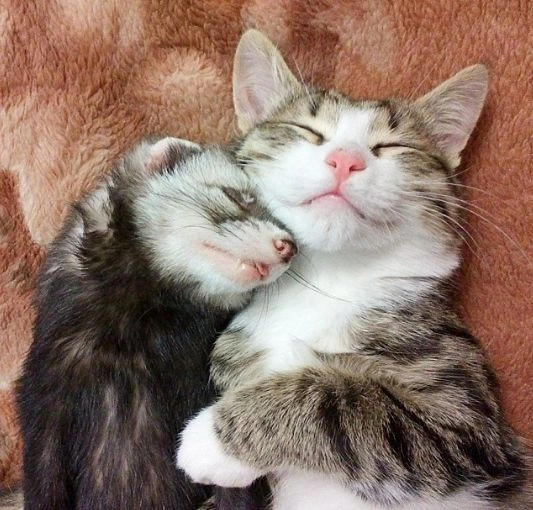
Ferrets and cats get along famously, unlike rabbits and guinea pigs. Several characteristics distinguish these two species: Both of them are crepuscular, hunter-eaters, and obligate carnivores. It is possible to teach ferrets to use a litter box.
Additionally, ferrets and cats frequently exhibit comparable behaviours. Their shared predatory nature means they will fight back fiercely if threatened. Thankfully, “play fighting” piques their interest more than actual fighting.
Pet Ferret Lifespan
How long your pet ferret lives can vary based on genes, what they eat, how active they are, and how well you care for them. Usually, pet ferrets live for about 5 to 7 years. But if they eat right, stay active, and get good care, they can live even longer, maybe up to 10 years or more.
The oldest ferret ever known lived to be 14 years old. So, taking good care of your ferret can help them live a long and happy life as your pet.
Are Ferrets As Pets Legal?
Yes, ferrets can be legal pets in many places. They belong to a family of Mustelids, including otters, minks, weasels, and polecats. Originally, ferrets were domesticated to help control pests, but now they’re loved as pets by many people.
In most states, having a pet ferret is okay, but in California and Hawaii, it’s only allowed if you have a special permit. Even though many people have tried to change this rule in California, citing a need to be there without permission is still illegal. The California Department of Fish and Wildlife worries that if pet ferrets escape or are abandoned, they could harm the rare native animals and birds in the state.
Why Ferrets Are Bad Pets?
Following are some reasons that why ferrets make terrible pets.
1: Avoid Isolating Ferrets
Ferrets need to be in a group. You still can’t mimic a ferret‘s behaviour or playfulness, no matter how much time you spend with it. Even if it’s just to run errands, you’ll have to get out of the house sometime.
There are several reasons why ferrets shouldn’t live with other pets. To start, they could mistake other little creatures for food. Additionally, they tend to be possessive and hostile towards other animals. Finally, remember that ferrets and dogs are different species and cannot satisfy each other’s social needs, even if your pet bonds with your dog.
After several ferrets have passed away, many people find themselves at a loss as to what to do with the last one. It would help if you were prepared to care for your ferrets’ social needs for life.
2: Beware Of Ferrets That Bite
Unlike guinea pigs and other similarly sized animals, ferrets aren’t submissive. Unhandled, they tend to bite. Find out the best way to hold your ferret by doing some study.
Biting while playing is also acceptable; if it persists, redirect the bites to other toys or end the play session. This is particularly helpful if your ferrets deal with kids or guests, as it teaches them not to bite.
3: Not Kid-Friendly Pets
If you handle a ferret improperly, it may bite. They require special care because they are little and delicate. Another labour-intensive pet is the ferret. Because of their tall cages and daily cleaning needs, these pets can be challenging for children. Along with hours of daily freedom to wander, they require frequent maintenance, which includes trimming their nails and brushing their teeth.
Please be prepared to take full responsibility for a child’s pet’s care if the youngster cannot do so before you get one for them. You should be ready to educate your child on proper animal handling techniques, keep a close eye on young children around pets, and shell out a pretty penny for vet visits.
4: Their Breed Is Deficient
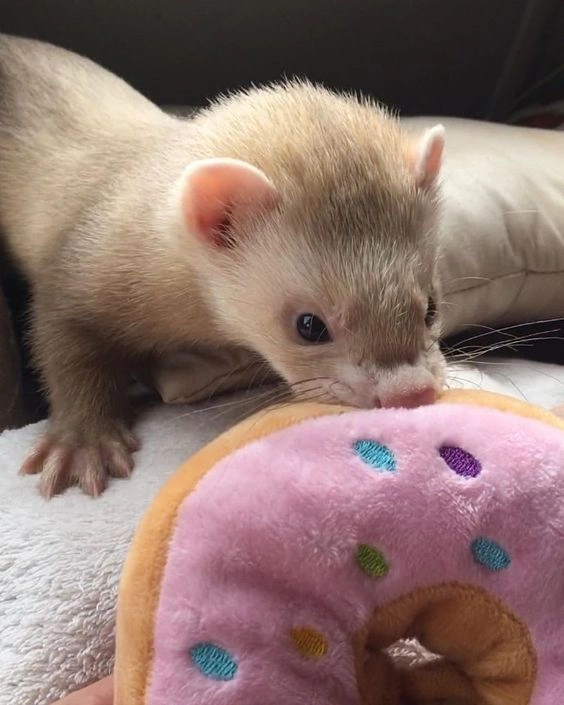
Finally, most ferrets are extremely unhealthy and poorly bred because they are obtained from ferret breeding mills, similar to puppy mills. Several health issues, including adrenal gland disorders, tumours, malignancies, and heart disease, contribute to their short lifespans.
Marshall, one of the most notorious American ferret breeding mills, has a long history of citations for animal cruelty from the US Department of Agriculture and is known to breed canines and ferrets for use in scientific research.
Can Ferrets Be Indoor Pets?

Ferrets can take pleasure in living indoors with their families. To prevent health problems such as obesity or joint mobility disorders, they will require access to a safe room in a secure location around the clock.
Indoor ferret housing is not suitable for all individuals. After they have been neutered, their smell will become less noticeable.
Ferrets As Pets Pros And Cons
Pros
- Ferrets Are Adorable
- Ferrets Are Inquisitive and Playful
- Intelligent Ferrets
- Ferrets Don’t Talk Much
- Feeding ferrets is simple.
- You Can Train Ferrets to Eat Litter
Cons
- They Require a Lot of Upkeep
- There’s a smell about them
Frequently Asked Questions
Are Ferrets Good Pets?
Ferrets have vibrant personalities, are inquisitive, enjoy having fun, and are very social animals. They would make wonderful pets; however, they are not the easiest to manage and have the potential to bite forcefully if they are startled. Therefore, they are not necessarily suitable for children to use as pets.
Are Ferrets High Maintenance?
The way Lamb describes them, “They’re more like dogs in a small package.” They require a great deal of high upkeep. When left unattended, ferrets must be confined in cages for their protection since they are handy escape artists.
Are Ferrets Family Friendly?
No they are not family friendly pets. Ferrets are not ideal for young children because ferrets can bite children, and children not properly trained to manage a ferret may injure their pets.
Source
Can Ferrets And Children Be A Good Mix?
I am a dedicated content writer with more than five years of experience, particularly skilled in the art of storytelling. My writing journey commenced during my college years, where I pursued journalism and unearthed my talent for creating captivating narratives.

